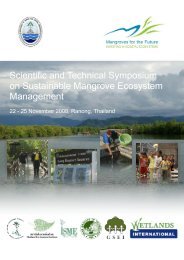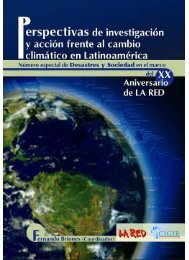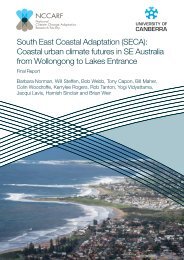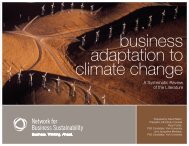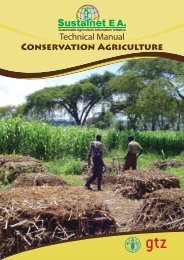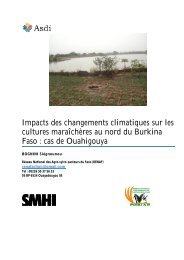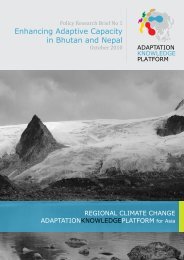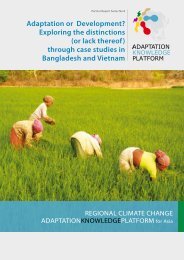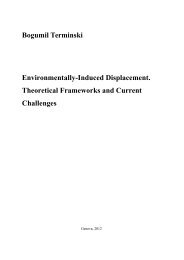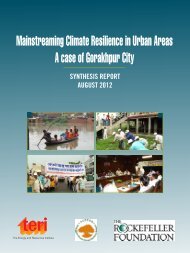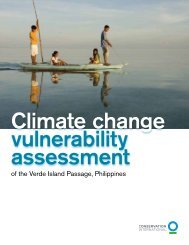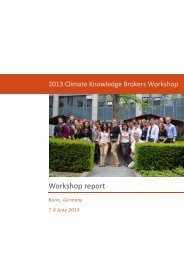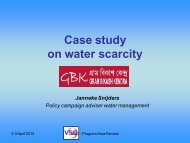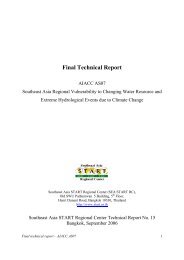should teach gardening to parents, never mind the kids. Parents need tolearn…Hospitals, universities you know [Farmer, Gold Coast].Part of this learning process is to educate our political leaders about the need for betterintegrated policies. That is, <strong>urban</strong> agriculture <strong>and</strong> the <strong>food</strong> system are not only about<strong>food</strong> production, or <strong>food</strong> retailing, but are concerned with the myriad of activities atdifferent scales that contribute to a healthy <strong>urban</strong> agriculture network. A commonsuggestion is the creation of Food Policy Councils, which are being established in anumber of North American cities. Food Policy Councils, bring stakeholders fromdifferent <strong>food</strong> sectors together to examine how the <strong>food</strong> system operates <strong>and</strong> how itcan be improved. Food Policy Councils also educate public officials <strong>and</strong> the public,draft <strong>food</strong> policies <strong>and</strong> coordinate between local <strong>and</strong> often disparate <strong>food</strong> programs.VicHealth is currently supporting the establishment of ‘Local Food Policy Coalitions’that will bring together over a dozen local councils in Melbourne <strong>and</strong> some regionalareas <strong>and</strong> will include a range of community-based stakeholders. The opportunityexists for these Coalitions in turn to be connected through formal coordinationmechanisms. This can feed into the existing policy <strong>and</strong> community work alreadyunderway in a number of local governments, <strong>and</strong> facilitate ex<strong>change</strong>s between inner<strong>urban</strong> <strong>and</strong> peri-<strong>urban</strong> councils:Everyone’s doing a little bit at this point, <strong>and</strong> I think eventually it’s going to hit thatwatershed point, where a peak body will form, <strong>and</strong> there will be some verysignificant movements, if the political will stays. Because that’s what’s driving it. Apeak body will be a formal inter-council coordination mechanism. It existsinformally at the moment with all the officers who have responsibilities related to<strong>urban</strong> agriculture getting together [Local government employee, Melbourne].Drawing on his experience in the United States, one local government officer inMelbourne also highlighted the dynamic synergies that can occur between localgovernment <strong>and</strong> community organisations <strong>and</strong> how together they can strengthen theshift towards a more sustainable <strong>and</strong> secure <strong>food</strong> system:There’s great work being done in the States by an organisation called the AgInnovations Network, based in San Francisco. They’re taking it county by county,a multi-stakeholder approach, getting some key things locked in, aroundsustainable agriculture, water protection, all these different things. Working withfarmers, producers – they’re building a network, county-by-county-by-county, <strong>and</strong>eventually, you pull the strings, <strong>and</strong> the whole State is seized up in that process.And you’ve shifted the paradigm.So for me, the local council is the driving [force], but it has to have strongparticipation from that non-government side of things. As the risk-taker, as thefacilitator, as the experimenter – that’s the power of the non-profit, they can give ita go, <strong>and</strong> they can crash <strong>and</strong> burn, <strong>and</strong> their accountability is much less severethan it is at council level, which has to answer to ratepayers, the media, <strong>and</strong> soon. That partnership, that edge between the two, is a very dynamic edge that Ithink needs to be strategically, <strong>and</strong> significantly developed [Local governmentemployee, Melbourne].<strong>Urban</strong> <strong>food</strong> <strong>security</strong>, <strong>urban</strong> <strong>resilience</strong> <strong>and</strong> <strong>climate</strong> <strong>change</strong> 143
Another important <strong>and</strong> tangible role that local governments can play to demonstrateleadership <strong>and</strong> commitment to local <strong>urban</strong> agricultural practices is through the adoptionof procurement policies that support locally grown <strong>food</strong>:This would be government sending a clear signal, <strong>and</strong> creating dem<strong>and</strong> for such<strong>food</strong>s. By setting st<strong>and</strong>ards about public procurement, it won’t be the soleanswer, but could stimulate production to meet those requirements. At themoment we don’t have any – <strong>and</strong> we need them. That would cover health, <strong>and</strong>ethical, sustainably-produced <strong>food</strong>. There are different approaches as to how thiscan be done. In the United Kingdom, there are government procurementst<strong>and</strong>ards for national departments, for example, eggs must be free-range,certain proportions of coffee <strong>and</strong> tea must be fair-trade, certain proportions of<strong>food</strong> must be sustainably grown, <strong>and</strong> so on [Academic researcher, Melbourne].Similarly, there are policies in place which incidentally support <strong>urban</strong> agriculturalpractices. On the Gold Coast, Gold Coast Permaculture proposed the diversion of partof the aquatic weed waste taken from the many water bodies from the city to its site tobe composted. In that way, a material perceived to be waste is not only re-used but isalso used as a micro-business opportunity as the excess compost can be sold to thegeneral community. However this process is not as easy <strong>and</strong> simple as it seems:We divert waste streams from the Gold Coast City Council. We take their aquaticweed <strong>and</strong> we take their woodchip because normally they'd dump that in a tip.They tip all their aquatic weed, about almost 1200 tonnes a year, into l<strong>and</strong>fill <strong>and</strong>so we've taken about, I guess, 500 cubic metres of that stuff so far; which is asignificant amount <strong>and</strong> we compost it… But now Council is saying, ‘Oh hang on,there are competition rules out there that say, we can't give this to you, all thiswater weed,’ seriously, ‘So we've got to tip it.’ I mean how dumb is that? Butyeah, council won't give it to us because they think it's against competition policy.There's a competition policy out there that all councils have to follow, which istotally nuts. So they'd rather dump it than give it to us [Micro farmer, Gold Coast].The cost-price squeeze <strong>and</strong> the power of supermarkets were mentioned by commercialgrowers <strong>and</strong> others as a significant barrier. One way of addressing this is by thesupporting diversified distribution <strong>and</strong> retail outlets. Farmers’ markets, supported by theVictorian Farmers’ Markets certification scheme, have exp<strong>and</strong>ed significantly inMelbourne <strong>and</strong> beyond in the past decade. On the Gold Coast, there is now asignificant network or markets with plans for further growth. New distribution modelssimilarly based around more direct forms of ex<strong>change</strong> between producers <strong>and</strong>consumers are also being trialled <strong>and</strong> scoped - CERES FairFood, Gold CoastPermaculture <strong>and</strong> the Casey Food Hub project, are all examples of this model.L<strong>and</strong> access <strong>and</strong> soil contamination were also major concerns for the expansion ofagricultural practices within cities, especially in the inner parts of Melbourne, wherel<strong>and</strong> is scarce <strong>and</strong> known to be contaminated from previous l<strong>and</strong> uses. With regard tothe issue of soil contamination, interviewees recommended that rather than leaving thisto individuals <strong>and</strong> community groups, a more systemic approach was required. It wassuggested that local governments should carry out audits of public l<strong>and</strong> that mightpotentially be used for <strong>food</strong> production in order to identify levels <strong>and</strong> types ofcontamination. Another proposal involved the allocation of extra resources within<strong>Urban</strong> <strong>food</strong> <strong>security</strong>, <strong>urban</strong> <strong>resilience</strong> <strong>and</strong> <strong>climate</strong> <strong>change</strong> 144
- Page 1 and 2:
Synthesis and Integrative ResearchF
- Page 3 and 4:
Published by the National Climate C
- Page 5 and 6:
ABSTRACTFood security is increasing
- Page 7 and 8:
1. a review of the literature: on n
- Page 9 and 10:
its Food for All project. This help
- Page 13 and 14:
In response to the existential thre
- Page 15 and 16:
2. OBJECTIVES OF THE RESEARCHFood i
- Page 17 and 18:
debates and to the more systematic
- Page 19 and 20:
organisation in the past few years.
- Page 21 and 22:
4. RESULTSIn this section we presen
- Page 23 and 24:
increasing productivity. Thus, whil
- Page 25 and 26:
people and the origins of their foo
- Page 27 and 28:
urban food supply chains. Thus, whi
- Page 29 and 30:
This logistics system is dominated
- Page 31 and 32:
Like Hodgson et al., as per definit
- Page 33 and 34:
esilient, powerful by being locally
- Page 35 and 36:
volume or even its contribution to
- Page 37:
community food growing can have on
- Page 40 and 41:
generations this history has been f
- Page 42 and 43:
a stronger focus on addressing the
- Page 44 and 45:
The third key aspect is fairness -
- Page 46 and 47:
climate (which we live and work in
- Page 48 and 49:
agriculture. Eight percent is in ur
- Page 50 and 51:
This concept of the ‘spaces in be
- Page 52 and 53:
esearch scientist and chair of the
- Page 54 and 55:
As discussed above, protection of t
- Page 56:
4.2.5 What is the extent and the im
- Page 60 and 61:
no place under the panoply of pract
- Page 62 and 63:
increased, the market dominance of
- Page 64 and 65:
… the residents of S Park called
- Page 66 and 67:
5. CONCLUSIONSThere is growing conc
- Page 68 and 69:
urban resilience. This inevitably c
- Page 70 and 71:
In many respects these contrasting
- Page 72 and 73:
Many interviewees of both standpoin
- Page 74 and 75:
a given area. The rationale for thi
- Page 76 and 77:
mapping the location of sources of
- Page 78 and 79:
Australian food policy debates refl
- Page 80 and 81:
APPENDIX 1: URBAN FOOD SECURITY, UR
- Page 82 and 83:
IntroductionGlobally, and in Austra
- Page 84 and 85:
Review methodsThis stage of the res
- Page 86 and 87:
despite many of the causes of food
- Page 88 and 89:
…by 2050… food production will
- Page 90 and 91:
2. How is food security (in general
- Page 92 and 93:
the food security of cities, but no
- Page 94 and 95:
While some see the density of devel
- Page 96 and 97:
when suppliers, distributors, and c
- Page 98 and 99:
a more prominent role in enhancing
- Page 100 and 101:
community gardens webpage on the Co
- Page 102 and 103: comprehensive description of the ca
- Page 104 and 105: In both the developed and developin
- Page 106 and 107: Their review notes a significant in
- Page 108 and 109: lines of supply from often rural pl
- Page 110 and 111: 1 IntroductionCities have always be
- Page 112 and 113: Despite some attempts to curb urban
- Page 114 and 115: the Gold Coast remains a city that
- Page 116 and 117: ackyard/community gardenernot affil
- Page 118 and 119: level in local government. VicHealt
- Page 120: Figure 2: Impacts on Municipal Food
- Page 125 and 126: security I recognise that the cost
- Page 127 and 128: United States, he offered the follo
- Page 129 and 130: This vision highlights the multi-fu
- Page 131 and 132: An environmental education centre.
- Page 133 and 134: Melbourne Food ForestA Melbourne ga
- Page 135 and 136: stakeholder consultations, the repo
- Page 137 and 138: can. We sense the changes. The earl
- Page 139 and 140: half-desert environments. We’re g
- Page 141 and 142: etain its basic function and struct
- Page 143 and 144: government; and that trying to get
- Page 145 and 146: the north and the west, where it wo
- Page 147 and 148: Why do people buy so much food that
- Page 149 and 150: urban agriculture (however broadly
- Page 151: enefits and risks. Before we can co
- Page 155 and 156: coast without any problems whatsoev
- Page 157 and 158: BIBLIOGRAPHYAECOM (2011) Scoping St
- Page 159 and 160: Burns, C. I., A. (2007). Measuring
- Page 161 and 162: Edwards, F., & Mercer, D. (2010). M
- Page 163 and 164: James, S. O’Neill, P. and Dimeski
- Page 165 and 166: Millar, R., 2012, ‘Government shi
- Page 167 and 168: Saltmarsh, N. M., J; Longhurst, N.
- Page 169 and 170: Walker B., 2008, Resilience Thinkin



